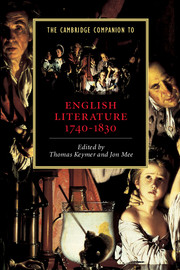Book contents
- Frontmatter
- Part I Contexts and modes
- 1 Readers, writers, reviewers, and the professionalization of literature
- 2 Criticism, taste, aesthetics
- 3 Literature and politics
- 4 Literature, national identity, and empire
- 5 Sensibility
- 6 Theatrical culture
- 7 Gothic
- Part II Writers, circles, traditions
- Index
- Series list
1 - Readers, writers, reviewers, and the professionalization of literature
from Part I - Contexts and modes
Published online by Cambridge University Press: 28 May 2006
- Frontmatter
- Part I Contexts and modes
- 1 Readers, writers, reviewers, and the professionalization of literature
- 2 Criticism, taste, aesthetics
- 3 Literature and politics
- 4 Literature, national identity, and empire
- 5 Sensibility
- 6 Theatrical culture
- 7 Gothic
- Part II Writers, circles, traditions
- Index
- Series list
Summary
'Reading is to the Mind, what Exercise is to the Body', wrote Richard Steele in his periodical paper, the Tatler, in 1710. By the middle of the eighteenth century, readers of all classes and kinds were plentiful, and were growing in both wealth and influence. Men and women, gentry and professionals, merchants and urban servants read all kinds of printed works, from scientific treatises and travelogues to jest books, sentimental plays, advertisements, collections of poetry, periodical journals and, in increasing numbers, novels. They read for information, for entertainment and for profit, but as the period wore on they were increasingly reading for a further reason: moral improvement. Reading had become a route for the development of the individual into a fully formed member of society. Thus, what people read, as well as how and where they read it, could be seen to indicate much about them. 'Miss Eliza Bennet . . . despises cards', sneers Caroline Bingley in Jane Austen's Pride and Prejudice (1813), as Elizabeth picks up a book: 'she is a great reader and has no pleasure in any thing else.' To this shallow and jealous upstart, Elizabeth Bennet’s love of reading proves her a dangerous rival for the aristocratic Darcy’s affection, for it denotes Elizabeth’s natural refinement. By now, reading shows both social and moral merit.
- Type
- Chapter
- Information
- Publisher: Cambridge University PressPrint publication year: 2004
- 4
- Cited by



